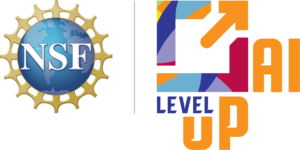NSF LEVEL UP: CRA-Led Community Effort Lays the Foundation for Transforming Undergraduate Computing Education in the Age of AI
By Matt Hazenbush, Director of Communications
The Computing Research Association (CRA) is spearheading efforts to transform and improve undergraduate computing education. With support from the National Science Foundation (NSF), community leaders, and NSF BPC Alliances, the NSF LEVEL UP initiative is building consensus on best practices for creating more effective, inclusive, and equitable computing programs. These efforts aim to ensure that all students have the opportunity to thrive in undergraduate computing education.
This collaborative effort engaged nearly 400 educators, researchers, and professionals from across the computing community through six regional workshops held in late 2023 and early 2024. The workshops laid a strong foundation for meaningful change, driving conversations about actionable strategies to address critical challenges and improve student experiences in computing education.
Engaging the Community to Drive Change
The NSF LEVEL UP workshops fostered dynamic, full-day discussions among participants, focusing on seven key challenges in undergraduate computing education. The workshops provided opportunities to explore innovative solutions that institutions can implement to create more effective learning environments.
Post-workshop surveys revealed overwhelmingly positive feedback, with over 90 percent of participants reporting that the sessions were productive. Many attendees noted the immediate impact of the discussions, including engaging their academic units in conversations about improvements before and after the workshops. This ripple effect underscores the initiative’s potential to transform undergraduate programs and better prepare students for careers in computing.
“NSF LEVEL UP demonstrated the computing community’s shared commitment to advancing undergraduate computing education,” said Tracy Camp, CRA Executive Director and CEO, during her presentation at the 2024 CRA Conference at Snowbird. “The strategies developed in these workshops have the potential to make a profound difference in our discipline.”
Actionable Insights: Four Initial High-Priority Strategies
Based on findings from the six workshops, CRA rolled out four initial evidence-based, high-priority strategies that academic leaders are encouraged to implement:
- Tracking and Reviewing Intersectional Data on Recruitment, Retention, and Performance in Individual Classes – Use disaggregated data to identify disparities and guide interventions to improve educational outcomes.
- Training TAs in Inclusive Teaching Practices – Equip teaching assistants with the skills to foster welcoming environments, particularly in introductory courses.
- Investing in Student Affinity Groups – Support groups that provide peer networks and foster belonging.
- Appointing Faculty Leaders for Broadening Participation in Computing (BPC) Efforts – Designate faculty champions to oversee and drive BPC initiatives.
Keep an eye on the NSF LEVEL UP site for helpful resources. They’ll provide support for implementing the four strategies, as well as offer additional strategies for academic leaders to consider.
NSF LEVEL UP AI: Expanding the Vision to Artificial Intelligence
 Discussions at the LEVEL UP workshops, along with insights from other CRA initiatives, have highlighted an urgent priority: the need to focus on undergraduate AI education. As AI reshapes industries and society at large, it is also redefining how we educate and train the future AI workforce. Addressing these shifts is critical to ensuring students are well-prepared to succeed in this rapidly advancing field.
Discussions at the LEVEL UP workshops, along with insights from other CRA initiatives, have highlighted an urgent priority: the need to focus on undergraduate AI education. As AI reshapes industries and society at large, it is also redefining how we educate and train the future AI workforce. Addressing these shifts is critical to ensuring students are well-prepared to succeed in this rapidly advancing field.
Building on the momentum generated by NSF LEVEL UP, the initiative is now evolving to address this transformative area of computing. Recognizing the growing influence and opportunities AI offers, the expanded program — NSF LEVEL UP AI — aims to bring the same energy and commitment to reshaping AI education as it has to undergraduate computing programs.
Part of NSF’s broader EducateAI program, NSF LEVEL UP AI seeks to expand and diversify AI education by:
- Increasing Capacity: Building the infrastructure and curricula needed to deliver high-quality AI education.
- Promoting Inclusion: Ensuring all students have access to AI resources and opportunities.
- Fostering Collaboration: Hosting virtual roundtables and regional workshops to develop actionable strategies for scaling AI education.
“Under NSF EducateAI and NSF IUSE: CUE, we funded the NSF LEVEL UP AI project, an effort that brings together educators, researchers, and professionals across the computing community to build a shared vision for expanding and diversifying AI education,” said Greg Hager, Assistant Director for CISE at NSF. “This project will serve as a hub for the NAIRR Pilot Classroom Education conferences, shaping and leveraging the infrastructure necessary to deliver quality AI education experiences.”
By aligning with the National AI Research Resource (NAIRR) Pilot initiative, NSF LEVEL UP AI ensures that institutions have access to the computational tools, data, and expertise needed to deliver inclusive, high-quality AI education.
The Path Forward: A Call to Action
NSF LEVEL UP and LEVEL UP AI represent a significant movement in transforming undergraduate computing and AI education. CRA invites academic leaders, educators, and researchers to join this effort by:
- Implementing the four initial LEVEL UP strategies within their programs (if not already done).
- Visiting the NSF LEVEL UP site for helpful resources and forthcoming strategies.
- Participating in upcoming LEVEL UP AI virtual roundtables and workshops.
- Collaborating with peers to share best practices and scale inclusive education initiatives.
“The computing research community is ready to continue this important work,” said Camp. “We’re excited to see how NSF LEVEL UP AI will expand our impact and further empower institutions to create opportunities for all students to thrive.”
CRA encourages readers to learn more about the initiative and get involved by visiting the NSF LEVEL UP AI webpage and signing up for updates. Together, the computing community can shape the future of computing education and prepare an inclusive, AI-ready workforce.


